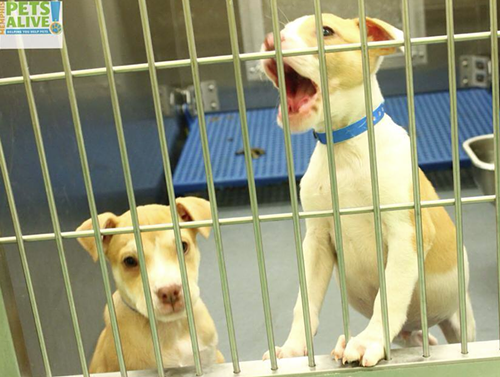
For more than a year, volunteers with Memphis Pets Alive have photographed every animal in the public viewing areas at Memphis Animal Services (MAS) each Tuesday evening. But last week, volunteer Dani Rutherford was asked to skip over the dogs in the shelter’s “healthy hold” area.
The healthy hold area is where potentially adoptable animals that have been at MAS for less than 72 hours are held. When a stray or owner-surrendered animal comes into the shelter, it is put under a 72-hour review. After 72 hours, if the animal isn’t claimed by an owner, MAS’ staff decides whether or not it will have a chance at adoption or be euthanized.
Since Memphis Pets Alive, a volunteer-run group that tries to market animals at MAS by posting pictures of the animals on Facebook, was formed last year, the technician who escorted the group around the shelter let them photograph those animals under the 72-hour hold.
But now MAS administrator James Rogers claims the group has been violating a policy that bans photographs of animals in the healthy hold area. Rogers was not available for interviews, but he posted a statement about the policy on the city website.
“Sharing photos of animals housed at MAS prematurely may create an unintentional reality of misleading a potential adopter into thinking that an animal is available when the pet may belong to another pet owner,” reads the statement. “MAS views the emotional trauma of such an unfortunate misunderstanding too great a risk and therefore asks rescuers and MAS partners, such as Memphis Pets Alive, to allow the 72-hour holding period to expire before taking and sharing photos of those animals.”
But Linda Baxter, president of Memphis Pets Alive, said they weren’t marketing the pets from the healthy hold area as being up for adoption but rather letting people know the animals are there. In fact, she said there have been cases when people who had lost their pets found them at the shelter through photos posted to the Memphis Pets Alive Facebook page.
“Our Facebook page clearly states that these animals are located at Memphis Animal Services. We do not say they are up for adoption,” Baxter said. “This is just a method of getting these photos out there in the community for people to see them so that, at the end of 72 hours, if the owner hasn’t claimed them, rescue networking can already be done.”
For the animals that may be euthanized at the end of the 72 hours, those few extra days of networking can be crucial.
And according to statistics from Save Our Shelter, a group aiming to reform MAS, the instances of owners reclaiming their pets from the 72-hour hold aren’t very high anyway. In March 2014, MAS took in 879 animals, and only 47 were reclaimed by their owners.
Baxter said, unless the policy is changed, her group will honor it, but rather than photographing animals once a week, they will try to send a volunteer every day to take pictures of animals as they’re released from the 72-hour hold. If those animals are to be euthanized, however, there won’t be much time to market them to adopters before it’s too late.
“This [policy] is going to directly lead to the death of animals,” said Cindy Sanders, co-founder of Community Action for Animals, another shelter reform group. “Mr. Rogers is always saying he is going to make MAS a world-class shelter. This is so counter-productive to being a world-class anything.”